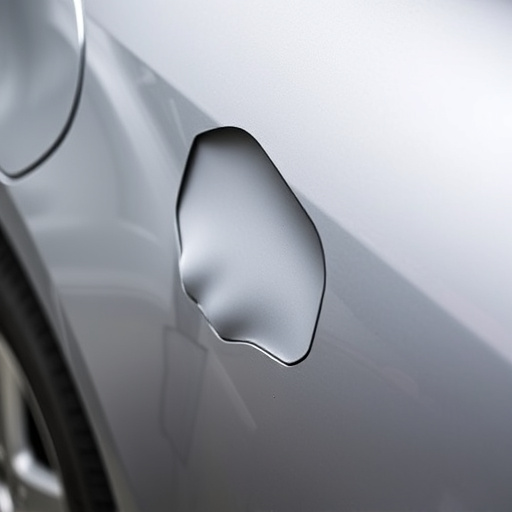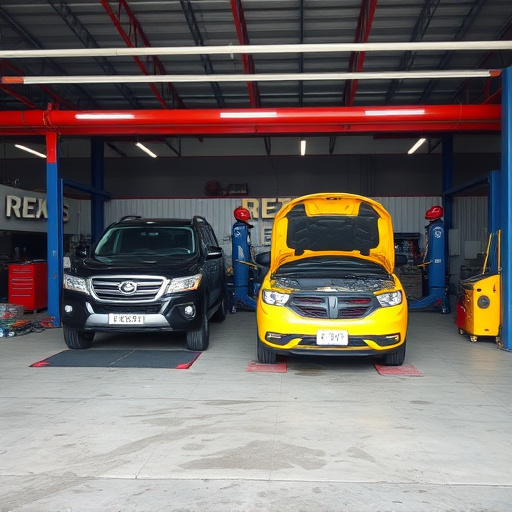Customer safety assurance in auto body shops goes beyond physical well-being by addressing environmental health factors. This involves evaluating and mitigating risks from air quality, chemical exposures, and noise, while integrating sustainable practices. By adhering to stringent environmental health standards, businesses enhance brand reputation, foster trust, and appeal to health-conscious consumers. Prioritizing eco-friendly practices like non-toxic materials and proper waste disposal creates a safer environment, boosting business reputation and streamlining operations for superior customer safety assurance.
In today’s digital era, understanding customer safety assurance involves recognizing environmental health factors as a crucial aspect. As businesses strive to enhance customer experiences, they must navigate an intricate web of potential risks and hazards in their operations. This article delves into the significance of integrating and managing environmental health risks, offering insights on how such strategies contribute to overall customer safety assurance. Key topics include defining customer safety, exploring environmental health factors, and implementing effective risk management practices for a thriving business ecosystem.
- Understanding Customer Safety Assurance in Today's Context
- Environmental Health Factors: A Crucial Aspect of Customer Safety
- Integrating and Managing Environmental Health Risks for Enhanced Customer Experience
Understanding Customer Safety Assurance in Today's Context

In today’s context, customer safety assurance goes beyond ensuring physical well-being; it encompasses a holistic approach to safeguard consumers from various environmental health factors that can impact their lives. This concept is pivotal in industries like automotive, where customers not only expect their vehicles to be in optimal condition but also demand assurance that their exposure to potentially harmful substances during frame straightening, collision repair, or car damage repair processes is minimized.
Customer safety assurance involves a comprehensive evaluation of the entire customer journey, from initial interaction to post-service feedback. It includes understanding and mitigating risks associated with air quality, chemical exposures, noise levels, and more in service settings. By integrating sustainable practices and adhering to stringent environmental health standards, businesses can foster trust, enhance brand reputation, and meet the evolving expectations of health-conscious consumers in today’s market.
Environmental Health Factors: A Crucial Aspect of Customer Safety

Environmental Health Factors play a pivotal role in enhancing customer safety assurance today. Beyond ensuring physical spaces are free from immediate hazards, it involves addressing broader ecological and toxicological considerations that impact human well-being. For instance, in the context of body shop services, proper ventilation to mitigate chemical fumes from car paint services or fender repair is essential to prevent respiratory issues among employees and customers.
This aspect of customer safety assurance extends beyond the immediate vicinity of a business operation. It encompasses broader environmental factors such as air quality, water safety, and waste management practices. Businesses that prioritize these elements contribute not only to the health and satisfaction of their customers but also to long-term community wellness and sustainability.
Integrating and Managing Environmental Health Risks for Enhanced Customer Experience

In today’s customer-centric market, environmental health factors play a pivotal role in ensuring not just product quality but also enhancing the overall experience for consumers. Integrating and managing environmental health risks within auto body shops is more than just adhering to regulations; it’s about fostering trust and loyalty among customers who are increasingly conscious of sustainability and safety. Auto body shops that prioritize these aspects can significantly boost their reputation as responsible businesses. By implementing eco-friendly practices, such as using non-toxic materials during vehicle restoration and proper disposal of hazardous waste, shops create a healthier environment for both employees and customers, ensuring long-term customer safety assurance.
This proactive approach extends beyond the workshop floor to the very essence of customer service. A well-managed environmental health program can streamline operations in an auto body shop, making processes more efficient and reducing costs. This, in turn, translates into faster turnaround times for vehicle bodywork repairs, ensuring customers receive their restored vehicles promptly. Such seamless integration of environmental considerations not only satisfies regulatory requirements but also sets a benchmark for excellence in customer safety assurance, fostering a positive brand image that resonates with modern consumers.
In today’s world, customer safety assurance goes beyond traditional product quality. Integrating environmental health factors as a crucial aspect of this assurance is essential for fostering a positive and sustainable customer experience. By understanding and managing environmental risks effectively, businesses can create a safer, healthier, and more appealing environment for their customers, ensuring long-term success and building consumer trust.













